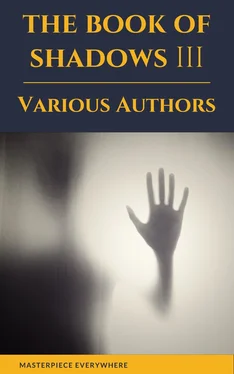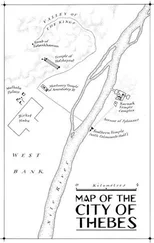Edith Nesbit - The Book of Shadows Vol 3
Здесь есть возможность читать онлайн «Edith Nesbit - The Book of Shadows Vol 3» — ознакомительный отрывок электронной книги совершенно бесплатно, а после прочтения отрывка купить полную версию. В некоторых случаях можно слушать аудио, скачать через торрент в формате fb2 и присутствует краткое содержание. Жанр: unrecognised, на английском языке. Описание произведения, (предисловие) а так же отзывы посетителей доступны на портале библиотеки ЛибКат.
- Название:The Book of Shadows Vol 3
- Автор:
- Жанр:
- Год:неизвестен
- ISBN:нет данных
- Рейтинг книги:4 / 5. Голосов: 1
-
Избранное:Добавить в избранное
- Отзывы:
-
Ваша оценка:
- 80
- 1
- 2
- 3
- 4
- 5
The Book of Shadows Vol 3: краткое содержание, описание и аннотация
Предлагаем к чтению аннотацию, описание, краткое содержание или предисловие (зависит от того, что написал сам автор книги «The Book of Shadows Vol 3»). Если вы не нашли необходимую информацию о книге — напишите в комментариях, мы постараемся отыскать её.
The best of the genre's literature.
In the Dark
by Mary Elizabeth Penn
(?–?)
No. 11 Welham Square
by Sir Herbert Stephen
(1857–1932)
Man-size in Marble
by Edith Nesbit
(1858–1924)
When I Was Dead
by Vincent O'Sullivan
(1872–1940)
The Library Window
by Margaret Oliphant
(1828–1897)
Lost Hearts
by M. R. James
(1862–1936)
The Shadowy Third
by Ellen Glasgow
(1873–1945)
The Beast with Five Fingers
by W. F. Harvey
(1885–1937)
Mrs. Lunt
by Sir Hugh Walpole
(1884–1941)
The Step
by E. F. Benson
(1867–1940)
The Book of Shadows Vol 3 — читать онлайн ознакомительный отрывок
Ниже представлен текст книги, разбитый по страницам. Система сохранения места последней прочитанной страницы, позволяет с удобством читать онлайн бесплатно книгу «The Book of Shadows Vol 3», без необходимости каждый раз заново искать на чём Вы остановились. Поставьте закладку, и сможете в любой момент перейти на страницу, на которой закончили чтение.
Интервал:
Закладка:
“What a pity,” said my youngest sister Patricia, “that we don’t still live in the dear old house in Welham Square! You could have got to the Museum from there in five minutes.”
I was born after we left Welham Square, but Patricia was six years my senior, and could remember her nursery days there.
“Not at all,” said my father, very abruptly; “the walk will do you all the good in the world.”
As the old gentleman had been, to all appearance, fast asleep for at least ten minutes, I was rather surprised at the energy with which he spoke. Looking up, I saw my mother making anxious signals to Patricia, which she followed up by instantly changing the subject.
A few days afterwards, as I descended reluctantly into the bowels of the earth at the Edgware Road Metropolitan Station, on the way to my new work for the first time, this episode recurred to my mind, and I began to speculate upon what might be the reasons that made the mention of Welham Square distasteful to my parents. I determined to consult my eldest sister Ellen on the subject, and from her, and some other sources, I gradually accumulated the facts which I will present here in the form of a continuous narrative.
No. 11 Welham Square has always been the freehold property of my family. It was built, together with several adjoining houses, about the beginning of the eighteenth century by the owner of a plot of land in which the houses stand, a retired attorney, who had two nephews. These were Andrew Masey, my great-great-great-grandfather, and his cousin, Ronald Masey. Ronald, who was generally thought to be his uncle’s favourite, and probable heir, was an exceedingly tall and powerful young man, with a forbidding and melancholy expression of countenance. As a boy he was singularly backward, and his incapacity for mental exertion seemed to develop, as he grew up, into something not far removed from downright idiocy. His weakness of mind caused him to be remarkably subject to the influence of those with whom he lived, and in particular his cousin Andrew, my ancestor, was supposed to exercise over him an influence almost amounting to fascination, and to be able to mould him to all the purposes of an exceptionally vigorous will. Shortly after the building of the houses in what is now Welham Square, the uncle of these young men died, and Andrew took possession of all his property under the provisions, as he asserted, of a will, the existence of which no one except Ronald had any interest in disputing, and which no one except Andrew, the sole executor and devisee, ever saw. Shortly before his uncle’s death, Ronald had become engaged to a young lady named Lettice White, to whom he was passionately attached, and it was generally supposed among the neighbours that upon his accession to the avuncular wealth the marriage would take place. But when a barely decent interval had occurred since the old gentleman’s obsequies, the fair Lettice was led to the altar, not by the impecunious Ronald, but by his more fortunate cousin Andrew. The newly married pair took up their residence in No. 11, and Ronald came to live with them.
When it was represented to Andrew by some of his few intimate acquaintances that this arrangement was so singular as almost to be thought improper, he curtly gave them to understand that Ronald’s mental condition was not such as to permit of his only living relation allowing him to live alone, and that he was compelled by the merest considerations of family affection to take the unfortunate young man into his own household. So the three lived on in the stately and somewhat gaunt mansion, Andrew collecting his rents with methodical regularity, and otherwise giving his neighbours but little concern. As for Ronald, there soon came to be Uttle doubt in anyone’s mind of his confirmed imbecility. He appeared seldom, and when he did, was for the most part silent, regarding his cousin and former betrothed with an expression of the profoundest submission, which at times merged into a look of wild and hardly human apprehension, “like a terrified brute-beast”, as it was put by an old lady who was one of the few friends occasionally privileged to partake of the gloomy hospitality of this uncomfortable establishment. Nothing more was ever known of the condition in which my ancestor, his wife, and his cousin lived, and no one was specially interested when, about six years after the marriage, Ronald, who had not been seen for many months, died, and was buried in a frugal manner.
Before he had been dead a year, Andrew and Lettice suddenly left their house and took up their abode elsewhere, and after a while a tenant was found for No. 11. Thirty years later, the lease of the house having expired, Andrew’s son, who had succeeded to his father’s property, came to reside there, but not for long. He left the house suddenly after a few years, and a rumour went abroad that it was haunted, probably by the ghost of the unfortunate Ronald. From this time No. 11 descended from father to son, the adjoining property being sold piecemeal as the family necessities dictated. Occasionally the successive freeholders made attempts to live there, but they never stayed more than a few months, and on each occasion of their removal the rumours of ghostly possession were renewed. These, however, would die away, and tenants would after a time be found, who never suffered from any inconvenience. The last occupation by the owner was that of my father, who moved into the house when my sister Patricia was a little girl. After living there a year he left precipitately, but Ellen could give me no particulars of his reasons for doing so, and knew only that he disliked any reference to the house, and never mentioned it himself. The house was now let to a stockbroker with a family.
II
Five years had elapsed since the conversation I related at the beginning of the previous chapter. My parents had both died, and Patricia was married and living with her husband in a provincial town. My career at the Museum had been a prosperous one, and I was now entrusted with a more responsible and better paid office. The tenant of No. 11 Welham Square had just given me notice of his intention to depart from it, and it occurred to me that it would be interesting to follow what seemed to be the family destiny, and try living in the house myself, to say nothing of the fact that it was admirably suited to my requirements. I felt fully capable of confronting any number of ghosts, and my wife was neither timid nor superstitious. Accordingly at the beginning of the new year we established ourselves, with our two babies, and my sister Ellen, who lived with us, in Welham Square, greatly delighted with the proximity of my work, with the solid masonry, spacious apartments, and roomy passages of our new abode, and with the remnant of eighteenth-century fashion and grandeur which seemed to pervade the neighbourhood. And in Welham Square we lived prosperously, without any kind of disturbance, for upwards of six months.
In the course of July my wife and the children left home to spend a couple of months at the seaside. I intended to join them when the time came to take my holiday, and in the meantime I stayed in London, going daily to my work. Ellen stayed on with me to keep house in the absence of her sister-in-law.
One evening, four or five days after my wife’s departure, I was sitting in my study, a large room with a door leading into the drawing-room, and a heavy curtain hung over my side of the door. It was past eleven; my sister had retired half an hour before, and the two maids who were left in the house were presumably in bed and asleep. I was therefore surprised to hear heavy and somewhat slow footsteps, apparently those of a large man, ascending the stairs from the ground-floor. The front door I knew was locked and chained, nor had I heard anyone ring. The steps paused for a moment on the landing outside my door, and then I heard the intruder proceed to go up the next flight of stairs leading to the bedrooms on the second floor. I sprang up, seized a candle, and opened the door. As I stood on the threshold of my room I seemed to hear footsteps, as of a man heavily mounting the stairs at the top of the flight leading up from my door. But, though I held the light above my head, I could see no one. Everything wore its usual aspect. I walked quickly up the stairs, but nobody was visible. I searched all the empty rooms, but with no result. I called up Ellen and the maids, but none of them had seen or heard anything. I am ashamed to say that I made a specially rigorous investigation of a large room at the back of the house, which we used for a night nursery, and which tradition declared to have been the abode of my ill-fated kinsman Ronald Masey I then went downstairs and completed my search of the entire premises. Everything was in order, and at the end of an hour I went back to my study and my book, rather annoyed with myself for having spent so much time in so fruitless an exploration, and determined to think nothing more about the matter.
Читать дальшеИнтервал:
Закладка:
Похожие книги на «The Book of Shadows Vol 3»
Представляем Вашему вниманию похожие книги на «The Book of Shadows Vol 3» списком для выбора. Мы отобрали схожую по названию и смыслу литературу в надежде предоставить читателям больше вариантов отыскать новые, интересные, ещё непрочитанные произведения.
Обсуждение, отзывы о книге «The Book of Shadows Vol 3» и просто собственные мнения читателей. Оставьте ваши комментарии, напишите, что Вы думаете о произведении, его смысле или главных героях. Укажите что конкретно понравилось, а что нет, и почему Вы так считаете.












